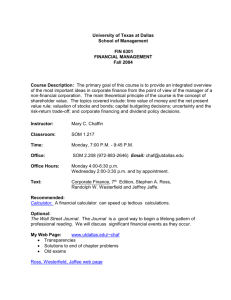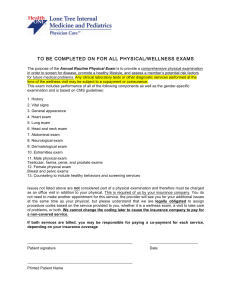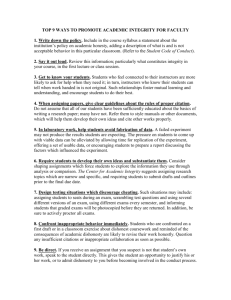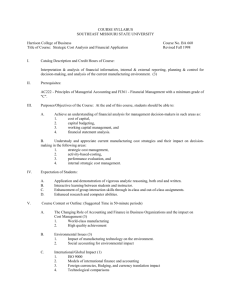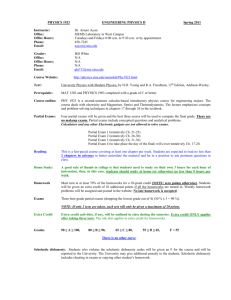Syllabus for Business Finance - University of Texas at El Paso
advertisement
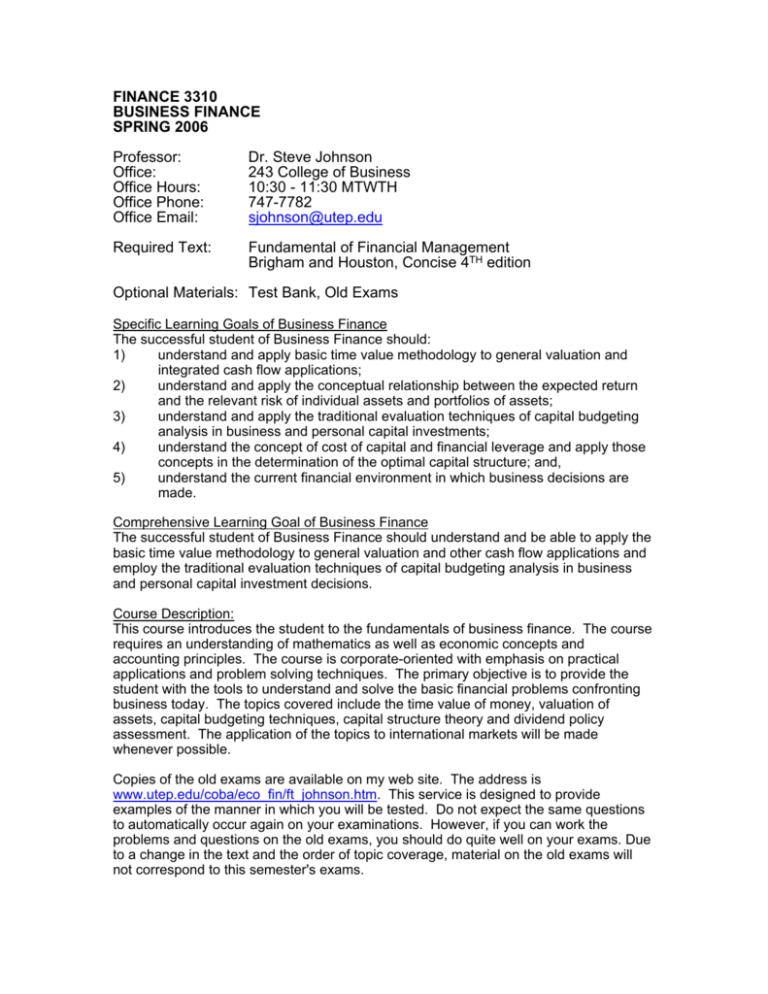
FINANCE 3310 BUSINESS FINANCE SPRING 2006 Professor: Office: Office Hours: Office Phone: Office Email: Dr. Steve Johnson 243 College of Business 10:30 - 11:30 MTWTH 747-7782 sjohnson@utep.edu Required Text: Fundamental of Financial Management Brigham and Houston, Concise 4TH edition Optional Materials: Test Bank, Old Exams Specific Learning Goals of Business Finance The successful student of Business Finance should: 1) understand and apply basic time value methodology to general valuation and integrated cash flow applications; 2) understand and apply the conceptual relationship between the expected return and the relevant risk of individual assets and portfolios of assets; 3) understand and apply the traditional evaluation techniques of capital budgeting analysis in business and personal capital investments; 4) understand the concept of cost of capital and financial leverage and apply those concepts in the determination of the optimal capital structure; and, 5) understand the current financial environment in which business decisions are made. Comprehensive Learning Goal of Business Finance The successful student of Business Finance should understand and be able to apply the basic time value methodology to general valuation and other cash flow applications and employ the traditional evaluation techniques of capital budgeting analysis in business and personal capital investment decisions. Course Description: This course introduces the student to the fundamentals of business finance. The course requires an understanding of mathematics as well as economic concepts and accounting principles. The course is corporate-oriented with emphasis on practical applications and problem solving techniques. The primary objective is to provide the student with the tools to understand and solve the basic financial problems confronting business today. The topics covered include the time value of money, valuation of assets, capital budgeting techniques, capital structure theory and dividend policy assessment. The application of the topics to international markets will be made whenever possible. Copies of the old exams are available on my web site. The address is www.utep.edu/coba/eco_fin/ft_johnson.htm. This service is designed to provide examples of the manner in which you will be tested. Do not expect the same questions to automatically occur again on your examinations. However, if you can work the problems and questions on the old exams, you should do quite well on your exams. Due to a change in the text and the order of topic coverage, material on the old exams will not correspond to this semester's exams. Course Objective: The successful completion of this course should provide the student with the basic skills that should be used in analyzing alternative business investments. Attendance Policy: Attendance will not be considered as part of the course grade; however, the student is responsible for all material covered in class. Class attendance and pertinent class participation could prove helpful for marginal students. Persistent tardiness will NOT be tolerated. Withdrawal Policy: A student may officially withdraw from this class with an automatic W at any time BEFORE March 24. No withdrawals will be allowed after this date. THIS IS UNIVERSITY POLICY. Automatic withdrawals will NOT be made by the instructor. To be withdrawn from the class, students must take the appropriate actions on or before the university deadlines. Incomplete Policy: It is the policy of the College of Business that INCOMPLETES be given only to students who need additional time to complete the specified assignments of a course. Incompletes WILL NOT BE GIVEN to those students who are not passing the course and wish to retake the course at a later date. Scholastic Integrity The University of Texas at El Paso prides itself on its standards of academic excellence. In all matters of intellectual pursuit, UTEP faculty and students must strive to achieve excellence based on the quality of work produced by the individual. In the classroom and in all other academic activities, students are expected to uphold the highest standards of academic integrity. Any form of scholastic dishonesty is an affront to the pursuit of knowledge and jeopardizes the quality of the degree awarded to all graduates of UTEP. It is imperative, therefore, that the members of this academic community understand the regulations pertaining to academic integrity and that all faculty insist on adherence to these standards. Any student who commits an act of scholastic dishonesty is subject to discipline. Scholastic dishonesty includes, but is not limited to, cheating, plagiarism, collusion, the submission for credit of any work or materials that are attributable in whole or in part to another person, taking an examination for another person, any act designed to give unfair advantage to a student or the attempt to commit such acts. Proven violations of the detailed regulations, as printed in the Handbook of Operating Procedures (HOP), and available in the Office of the Dean of Students, and the homepage of The Dean of Students (DOS) at www.utep.edu. may result in sanctions ranging from disciplinary probation, to failing grade on the work in question, to a failing grade in the course, to suspension or dismissal, among others Examination and Grading Policy: There will be three exams during the semester plus a final exam. All exams will be problem-oriented and multiple-choice questions. Each exam will represent 25 percent of the overall grade. It will be given during the assigned examination period. Makeup exams will only be given to those students who miss exams due to “excused absences due to university-recognized activities”. See student handbook for a description of these activities. All other students are required to take the exams as scheduled. Final Grade: The final grade in this class will be based on the following scale: To make an “A”, you must score at least 88 percent of the point total. To make a “B”, you must score at least 76 percent of the point total. To make a “C”, you must score at least 64 percent of the point total. To make a “D”, you must score at least 50 percent of the point total. Do not anticipate any further grade adjustments. Course Outline Topic Introduction to Managerial Finance Chapters 1 Approximate Dates January 17 Financial Statements, Cash Flow and Taxes 2 January 19 & 24 Analysis of Financial Statements 3 January 26 & 31 The Financial Environment 4 February 2 - 9 Examination 1 February 14 Risk and Rates of Return 5 February 16 - 23 Time Value of Money 7 6 February 28 – March Examination 2 March 9 Bond Valuation 7 March 21 & 23 Stock Valuation 8 March 28 & 30 Cost of Capital 9 April 4 & 6 Examination 3 April 11 Capital Budgeting 10 - 11 April 13 - 20 Capital Structure and Leverage 12 April 25 & 27 Dividend Theory 13 May 2 & 4 Final Exam Tuesday May 9 10:00 AM
